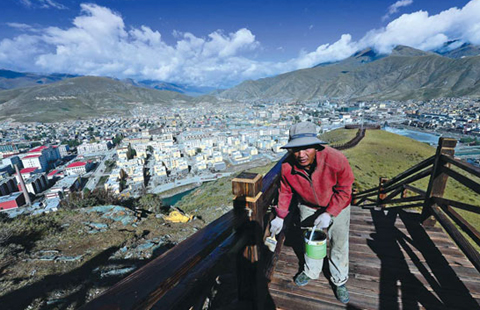Ivory crackdown efforts sharpened
Updated: 2014-08-29 07:24
By Doug Meigs in Hong Kong(China Daily Europe)
|
|||||||||||
Recent milestones for nation include public destruction of large quantities of seized pieces
Record ivory seizures - combined with a Chinese crackdown on illegal wildlife trafficking - could mark a turning point in global efforts to save the African elephant.
Twenty-five years have passed since the Convention on International Trade in Endangered Species of Wild Fauna and Flora banned the ivory trade in 1989. Yet the circumstances of African elephants remain dire.
Poachers slaughter elephants for tusks that feed a global black market. Clandestine blood ivory helps to finance terrorism and criminal syndicates such as al-Shabaab's 2013 Westgate Mall massacre in Nairobi, Kenya, and Joseph Kony's guerrilla Lord's Resistance Army in central Africa.
But global enforcement is mounting in the face of persistent poaching. Governments seized 51,303 kilograms of contraband ivory last year in 22 large-scale confiscations worldwide.
"Just looking at large-scale ivory seizures, 2013 represents the highest quantity of ivory seized in 25 years of data going back to 1989," says Tom Milliken, an elephant and rhino expert who manages CITES' database of ivory seizures.
CITES mandated eight countries "of primary concern in the poaching of elephants and the illegal trade in ivory" to establish new action plans since March 2013. China was one of the countries, joining Kenya, Uganda, Tanzania, Malaysia, the Philippines, Thailand and Vietnam.
Contraband ivory seizures in Africa have surpassed the tally in Asia following the implementation of national action plans, according to a CITES report presented at the 65th meeting of the CITES Standing Committee in Geneva, Switzerland, in July.
"It is clear that these countries are now in the forefront of those which are making large-scale ivory seizures, so certainly some measure of improved law enforcement effort is at play here," says Milliken. "It is hoped that these collective efforts will lead to a decrease in illegal trade in ivory and the illegal killing of elephants."
China's ongoing crackdown on illegal ivory is apparent through a number of milestones achieved in 2014.
The government destroyed more than six tons of confiscated ivory to start the year. Two crushers pulverized raw tusks and carved ivory pieces at a ceremony in Dongguan, Guangdong province on Jan 6.
"The event, the first public ivory destruction in China, was to demonstrate the country's determination to discourage illegal ivory trade, protect wildlife and raise public awareness," says Zhang Jianlong, deputy head of the State Forestry Administration.
Later that month, Chinese law enforcement for the first time sent agents to Kenya to help arrest and extradite an ivory smuggling suspect. The man, surnamed Xue, was arrested in Nairobi on Jan 17.
The sting was part of a larger multinational operation codenamed Cobra II, which has resulted in capturing more than three tons of ivory tusks and products, over 1,000 hides, 36 rhino horns and a large number of other wildlife products, along with more than 400 arrests.
Xinhua reported that Chinese authorities - forestry, customs, police, judiciary and quarantine departments - put more than 100,000 staff on the operation, and uncovered over 200 cases involving more than 250 suspects.
"China played a leading role in operation Cobra II," says Wan Zi-ming, director of the Law Enforcement Department with the China Endangered Species Import and Export Management Office.
Hong Kong has followed the ivory crushing example set by the Chinese mainland. On May 15, Hong Kong began destroying its 30-ton ivory stockpile with the burning of 1.2 tons of tusks. The destruction aims to prevent the contraband from re-entering the market.
Ivory that predates the international ban is still legal to trade with valid documentation. China also holds a stockpile of CITES-approved African elephant ivory purchased from a 2008 one-off sale intended to help sustain the country's traditional ivory craftsmen. All ivory from the one-off sale is forbidden from leaving the country.
"Currently, China has around 100 licensed elephant ivory vendors," says Jin Yu, director of the Wildlife Product Management Unit. Jin developed the database for tracking licensed ivory trading within China for the State Forestry Administration.
"If you follow the rules, then there is no way to take the ivory from the 2008 one-off sale abroad," she says.
For China Daily
(China Daily European Weekly 08/29/2014 page24)
Today's Top News
Obama says 'no IS strategy yet'
China calls for ceasefire in Ukraine
British PM stresses advantages for Scotland to stay in Britain
Girl, 9, kills shooting range instructor
IMF chief Lagarde investigated in graft case
1,400 children exploited in UK town
China, Russia enhance military ties
Turkish FM elected as premier
Hot Topics
Lunar probe , China growth forecasts, Emission rules get tougher, China seen through 'colored lens', International board,
Editor's Picks

|

|

|

|

|

|





